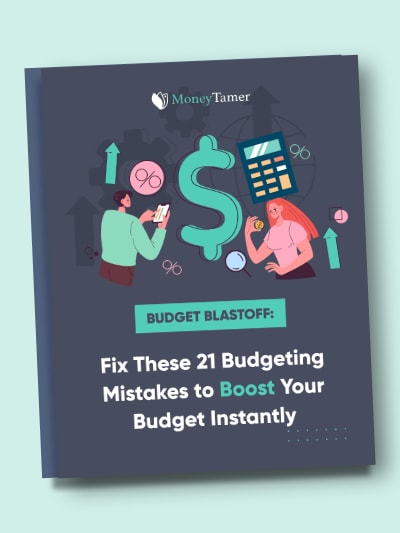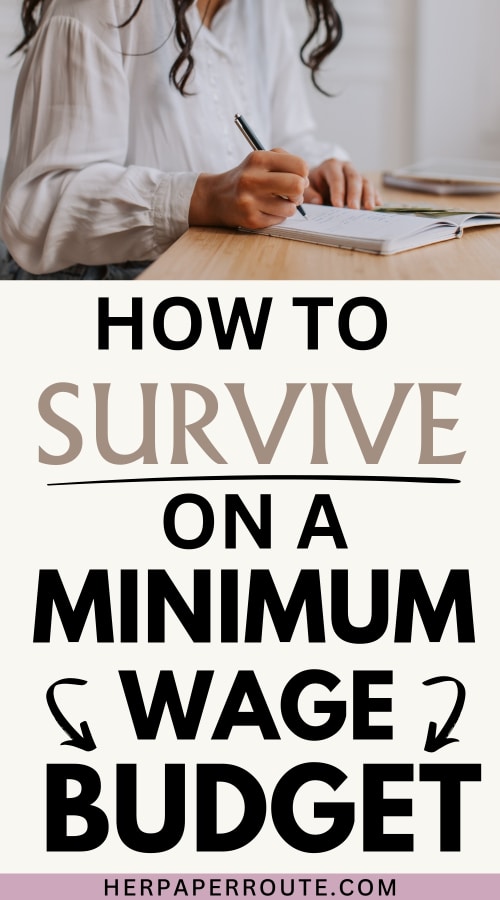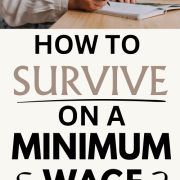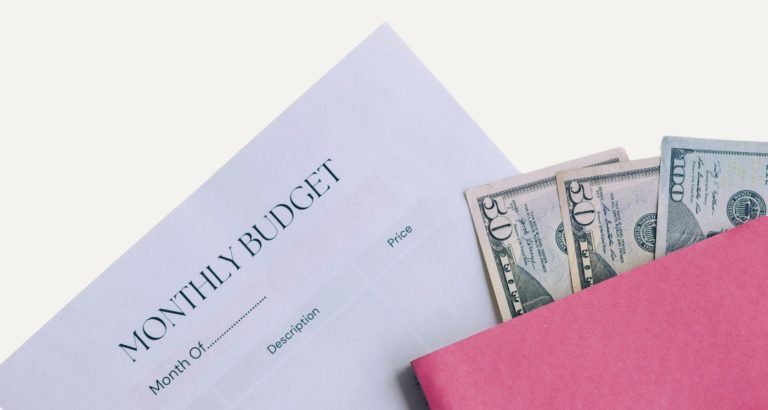Surviving On A Minimum Wage Budget: Smart Tips

If you are someone who lives on minimum wage, you may feel like you’re sinking in a sea of debt. It’s easy to feel that way, and it’s hard to live on so little money.
However, that doesn’t mean you have no options or that it can’t be done. I know it’s hard to believe, but I’ve come up with a plan that can help you live comfortably on minimum wage.
As an affiliate partner of various brands and sponsored content, HerPaperRoute may earn commission on qualifying purchases. Disclaimer
The good news is you don’t need to be a financial wizard and can still manage your money, stay or get out of debt, and save money for the future.
What Is Minimum Wage?
Each state has its own minimum wage, but the federal government says that it must be at least $7.25 each hour. I’m going to use this number for any examples, so if you make a little more, you’ve got a little wiggle room (and congratulations to you!)
Of course, this amount was proposed to cover shelter, food, and clothing and was installed so that companies couldn’t charge less for their jobs. However, with time, inflation happened, so everything got more expensive, but the minimum wage wasn’t raised. Though some states do give more, it may be because you’re in a higher cost of living area so everything costs more.
Calculate Your Income
You need to determine where your money comes from, and this doesn’t just include wages. You may have capital gains, child support, house properties, and your salary. Generally, though, if you live on minimum wage, you aren’t going to have properties to rent and a lot of investments.
For these examples, I am only going to include the federal wages you earn through a 40-hour workweek. That way, if you have a little more coming in, you can plan accordingly with the tools I provide.
If you make $7.25 an hour, this means you make roughly $290 before the taxes are removed. This is about $15,080 for the year. Once taxes are taken out, you earn a net income of $13,572, which means you’ve got about $1,131 to play with each month.
Track Expenses
Now, you need to consider where you spend your money. This is the scary part for most people because the amount you spend each month is likely more than what you bring in. You can accommodate for this by working side jobs or lowering your monthly bills.
It’s ideal to track spending habits for a full 30 days (or one calendar month). Follow this easy budgeting guide that’s perfect for beginners.
Include every single thing you buy, even if it’s just a trip to the convenience store for a soda. It’s a little tedious to do this, but it gives you the best picture of your spending habits and where all your money is going.
Buy a cheap notebook and include every expense for the month (including the price of that notebook you just bought). You may also use a budgeting template or can find a free app on your phone.
When you spend money, make sure you record it at that moment. This way, you don’t lose the receipt or forget. One way to make tracking your money easier is by using the cash envelope method.
Use technology to your advantage here. You can find expense tracker apps. They are linked to your bank account, so you can note everything without having to remember. If you’ve got multiple accounts, though, this gets trickier.
Most people don’t like to look at their purchases and expenses, but it is essential to weed out careless spending and know where to start for your budget.
If you just can’t do this step, then at least focus on the necessities you must spend money on, such as insurance, housing, food, clothing, debts, and the like. Here are recommended household budgeting percentages to help give you averages.
Make A List Of All Expenses
The next step of your minimum wage budget plan is to make a list of everything you need for the month. This includes gasoline, utilities, rent, and the like.
If you pay for health insurance, include that amount. This is another scary part because this can quickly wipe out your $1,131 a month on minimum wage.
Still, you’ve got to know where the money goes so that you can make sure you’re not going further into debt each month that you’re living here.

How To Budget Irregular Expenses
Many times, irregular expenses are those that must be paid each month but vary. Your electricity bill, water bill, and insurance (car and renter’s) might fall into this category. You can plan for them, but it takes a little research.
For the water and electricity, you can call the companies and request a list of everything you spent over the last year. If you pay online, this might be available on the website, too.
When your bills run similarly each month, you can add them all up for the year and divide that number by 12, giving you the average you spend. Some people may pay wildly different amounts based on whether air conditioning or heat is used.
Consider the highest price you paid last year and use that when working the budget. Some months, you might have a bit leftover, and other months, you’re going to have exactly the right amount.
Irregular expenses might also include holidays where you exchange gifts. These can consist of family anniversaries, birthdays, Hanukkah, Christmas, and the like. For these types of expenses, I recommend setting up sinking funds.
The rule of thumb for me is to create a separate budget for each month of the year. It does take some extra planning, but you can use it over and over. That way, you can plan for your mom’s birthday in July and your anniversary in October.
If you can’t do that or don’t want to, try to have a little extra money left over each month and put it in a savings account. Dip into it for gift-giving holidays so that you aren’t spending bill money.
Choose Flexibility
While you don’t have a lot of money to play with, you can still be flexible. Make sure that you’re not living above your means. This might require you to move to a cheaper apartment or move in with roommates.
Generally, I prefer to stick to a structure of 50 percent going to housing, food, and other necessities. Then 20 percent should be saved for emergency funds, debt, or retirement. The remaining 30 percent gets divvied up between other budgeting categories.
However, you’ve got to be realistic. Your needs might be different than someone else’s or may vary for each month. That means you’ve got to be allowed to adjust it appropriately.
If you focus on 20 percent being saved each month, this gives you a little room to play in case you go over your budget. With the $1,131 amount for federal minimum wage, this is $226.20 a month that you’re saving. You’ve got $565.50 to cover food and rent, with roughly $339 going toward all other costs.
How To Minimize Costs
To help cut costs on housing, you may need to consider having a roommate. Some people enjoy this, but others find it too hard to handle.
If that isn’t an option, you may need to move to a less expensive area of the city or in the suburbs. Just remember that you may spend more on gasoline and car maintenance so that you can get to work.
You can also cut costs on food. This can still allow you to eat healthily and enjoy eating. Make sure you’re setting a weekly plan and map out the meals you want to make. Here are my tips for meal planning on a tight budget.
The list you create should include everything you need and might desire (such as a cookie or a bag of chips). Then, when you’re at the store, don’t buy it if it’s not on the list. This holds you accountable.
You should always take advantage of sales and deals. There’s no shame in buying manager-special foods and freezing them. In fact, making freezer meals saves you a ton of money and removes the temptation to order takeout.
Consider how much money you spend on sodas, bottled water, and the like. It might be a good idea to buy a water filtration system for the sink. Save money in the long run and still enjoy fresh-tasting water.
If you qualify, food stamps and food banks are also a great way to get nutritious food without spending your money. It’s easy to see if you are eligible and can save you a lot of money. While many find it a taboo subject, the goal is to save money where you can, so I don’t think you need to worry too much.
It’s also important to try to cut transportation costs. Most people want a car to get back and forth. If you live in a big city, it might be easy to walk to work and everywhere else you need to go. However, most people don’t have that luxury.
You can choose to use the bus or other forms of public transportation. Make sure that you select the most cost-friendly option, such as buying a monthly pass.
Those who own a vehicle might consider carpooling with their co-workers. Everyone can save a little money on gas and maintenance while still getting to work on time. This can be a little weird at first, but it is a great opportunity to get to know each other a bit better.
Lastly, try to find unique ways to cut down on your utilities.
Get Help From The Government
While I did tackle this a little earlier, it deserves its own headline. Remember, you are entitled to receive financial help. It isn’t a hand-out, and those who say it is are likely ignorant of the rules. You are working hard and still can’t afford basics, like food.
Often, the government can help you with housing issues. It can also help you pay your utilities, car insurance, and cover child care. Some states have free phone programs, EBT, and cash assistance, as well. If you’re eligible, there is no reason not to apply for these benefits and utilize them to help you save money.
Save, Save, Save
It’s hard to save money if you don’t have a lot of income rolling in, but it’s possible. If you haven’t been living beneath your means, it’s going to take time to adjust.
Seeing your savings account grow can be positive and shows you’re doing the right thing. The more you can save, the better. It’s alright if you can only save $20 at first, it’s better than nothing.
Every single paycheck should have something removed and put into a savings account. Again, it can be as low as $20. As you start saving more, put it away for a rainy day (or emergency fund).
Avoid Debt
It’s tough to live on minimum wage, but you must avoid getting into debt. Using credit cards can seem like the easy path, but it’s easy to fall into the trap of being unable to pay them off each month.
Likewise, payday loans aren’t a good way to keep money coming in because they can lead you further into debt. If you find yourself in debt, here are ways to pay off debt fast, even on a low income.
Earn More
No, I’m not telling you that you’re doing anything wrong here. It’s hard to earn more money when you live on minimum wage. However, there are always opportunities out there.
You may get a raise if you take on additional responsibilities. Even at fast-food restaurants, there are ways to advance, such as becoming a trainer or manager.
This also means that you may need to go to school to get additional training. This is another expense, which must be saved for, as well. Look into these ways to go to college debt-free before assuming you need to take out student loans.
You can get federal and state funding to go back to school. Try to choose a career that you are going to like and one that is popular and should continue to grow. The medical field is excellent and provides a variety of jobs.
Surviving On A Minimum Wage Budget – Conclusion
Having a minimum wage budget plan is essential if you only get the state’s bare minimum and want to save money or live comfortably. It’s not easy to do it, but it is possible.
All the while, you can be looking for better-paying jobs and stay out of debt, making life even easier for you. Now is the time to focus on your budget and take control of your finances for the present and the future.

Follow along on Instagram!










